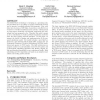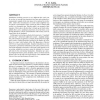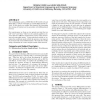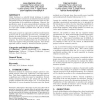SIMUTOOLS
2008
14 years 1 months ago
2008
For the evaluation of ad hoc network protocols, researchers traditionally use simulations because they easily allow for a large number of nodes and reproducible environment condit...
SIMUTOOLS
2008
14 years 1 months ago
2008
The IEEE 802.16 technology is emerging as a promising solution for BWA due to its ability to support multimedia services and to operate in multiple physical environments. Also, wi...
SIMUTOOLS
2008
14 years 1 months ago
2008
SIMUTOOLS
2008
14 years 1 months ago
2008
Simulations involving processes at very different time scales can be so slow to converge that starting in one state and waiting for a representative sample of the state space to b...
SIMUTOOLS
2008
14 years 1 months ago
2008
In this paper we present a methodology for the evaluation of networked systems communicating using WLAN technology. We show a case study of goal-oriented cooperating robots, for w...
SIMUTOOLS
2008
14 years 1 months ago
2008
New technologies such as IEEE 802.16 (Wi-MAX) [2] and IEEE 802.11e (Wi-Fi with QoS) [1] enable differentiated services. In this study we explore the potential for increasing the r...
SIMUTOOLS
2008
14 years 1 months ago
2008
In this paper we present DeSiNe, a modular flow-level network simulator. DeSiNe is aimed at performance analysis and benchmarking of Quality of Service routing algorithms and traf...
SIMUTOOLS
2008
14 years 1 months ago
2008
As its name promises, the Unified Modeling Language (UML) provides a collection of diagrammatic modeling styles. To the early class/objects and use-case diagrams were almost immed...
SIMUTOOLS
2008
14 years 1 months ago
2008
Evaluating the performance of a cooperative relaying protocol requires an implementation for simulators and/or software-defined radios (SDRs) with an appropriate model for error d...
SIMUTOOLS
2008
14 years 1 months ago
2008
Model checking is a suitable formal technique to analyze parallel programs' execution in an industrial context because automated tools can be designed and operated with very ...




